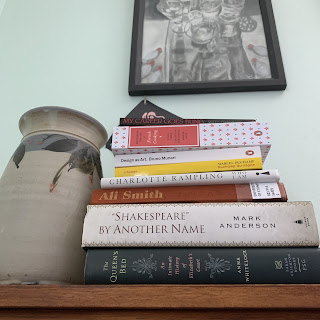On honest stuff and collapsing wonderlands
Dear Void,
Today I made a
start on anthropologist Michael Taussig’s Mastery of Non-mastery in the Age of Meltdown,
a small chapter on Mimetic Excess. Only about 1500 words.
Taussig uses the
phrase ‘metamorphic sublime’ to describe the situation we find ourselves in
right now. Globally, we are in ‘wonderlands’ that were once make-believe (if
only we’d made ourselves believe that the wonderlands were imminent. This is a great graphic that came across my Twitter feed yesterday, describing 40 years of doing fuck-all,
even as we reported to ourselves and predicted the changes we Fossil
Fuel ‘firms’ were causing. We are not innocent).
40 years of blah blah blah. pic.twitter.com/9QD6OFjaa5
— Timothée Parrique (@timparrique) February 1, 2022
We’ve moved up to a
threshold of change. ‘Metamorphic’ also denotes rock that undergoes change,
say, by the folding of strata or the intrusion of igneous rock, solidified
magma. The analogy is potent. Something seemingly unlikely to change state can,
at scale or distance that is difficult to perceive from where we stand,
collapse.
Taussig characterised
the analogous components of two things as being a gift! I didn’t quite go with
him on this point which had moved into a strange discussion around the bird’s
wing needing something in return for having given us its analogy, the wing of
an airplane. I made notes, which were mostly question marks and I have to find Walter
Benjamin’s ‘Doctrine of the Similar’ and ‘On the Mimetic Faculty’. You may be
reading this and yelling, Julie, you have enough material already and, anyway, when are you going to get to the commonplace book and Lady Mary? I’m
glad you ask. Because just as I got to Taussig’s point about us being mimetic
beings living in unstable weather patterns, geological shifts and the like,
I was reminded of a letter Lady Mary had written. The gift of the analogous
component I suppose.
In August 1741,
Lady Mary Wortley Montagu wrote, from Genoa, to her husband back in England, a
letter in which she reports having learned of the death of Lord Oxford. A
death, Lady Mary, writes
‘which he advanced by choice, refusing all remedies till it was too late to make use of them. There was a will found dated 1728, in which he gave everything to my lady* : which has affected her very much. Notwithstanding the many reasons she had to complain of him, I always thought there was more weakness than dishonesty in his actions, and is [sic] a confirmation of the truth of that maxim of Mr. Rochefoucault, un sot n'a pas assez d'étoffe pour être un honnête homme.**
*His
wife and Lady Mary’s friend Lady Henrietta Cavendish Holles (1694-1755)
** 'a fool does not have enough stuff to be an honest man'
So, what’s my point? Well, either we collectively are one giant Lord Oxford refusing remedies, and advancing death by choice. Or, and this might just be the case, we have in power those sort of sots ‘fools’ who simply do not have the right stuff or substance to be honest.
Lesson? Well, if it is within our power to choose honest people to
lead us, let’s do that. But they have to be protected from bad actors who just
want to make a buck while they’re here and fuck what happens to the rest. Yes, leaders who are honest, that have the fabric of honesty within themselves, and a team of bodyguards to beat off lobbyists with wads of cash, and slimeballs in general.
I’m a bit sweary
today. Not very professional and I do want this blog to be in some way a
professional expression of the real work of arts research. It’s just, sometimes
. . . well, you know. And so, Void, I read on.
J.


Comments
Post a Comment